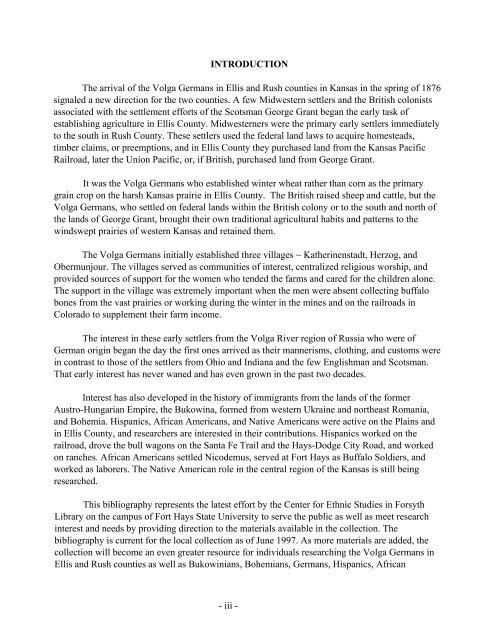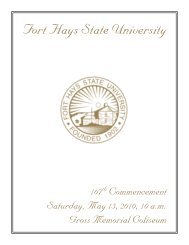The Center for Ethnic Studies - Fort Hays State University
The Center for Ethnic Studies - Fort Hays State University
The Center for Ethnic Studies - Fort Hays State University
You also want an ePaper? Increase the reach of your titles
YUMPU automatically turns print PDFs into web optimized ePapers that Google loves.
INTRODUCTION<br />
<strong>The</strong> arrival of the Volga Germans in Ellis and Rush counties in Kansas in the spring of 1876<br />
signaled a new direction <strong>for</strong> the two counties. A few Midwestern settlers and the British colonists<br />
associated with the settlement ef<strong>for</strong>ts of the Scotsman George Grant began the early task of<br />
establishing agriculture in Ellis County. Midwesterners were the primary early settlers immediately<br />
to the south in Rush County. <strong>The</strong>se settlers used the federal land laws to acquire homesteads,<br />
timber claims, or preemptions, and in Ellis County they purchased land from the Kansas Pacific<br />
Railroad, later the Union Pacific, or, if British, purchased land from George Grant.<br />
It was the Volga Germans who established winter wheat rather than corn as the primary<br />
grain crop on the harsh Kansas prairie in Ellis County. <strong>The</strong> British raised sheep and cattle, but the<br />
Volga Germans, who settled on federal lands within the British colony or to the south and north of<br />
the lands of George Grant, brought their own traditional agricultural habits and patterns to the<br />
windswept prairies of western Kansas and retained them.<br />
<strong>The</strong> Volga Germans initially established three villages ~ Katherinenstadt, Herzog, and<br />
Obermunjour. <strong>The</strong> villages served as communities of interest, centralized religious worship, and<br />
provided sources of support <strong>for</strong> the women who tended the farms and cared <strong>for</strong> the children alone.<br />
<strong>The</strong> support in the village was extremely important when the men were absent collecting buffalo<br />
bones from the vast prairies or working during the winter in the mines and on the railroads in<br />
Colorado to supplement their farm income.<br />
<strong>The</strong> interest in these early settlers from the Volga River region of Russia who were of<br />
German origin began the day the first ones arrived as their mannerisms, clothing, and customs were<br />
in contrast to those of the settlers from Ohio and Indiana and the few Englishman and Scotsman.<br />
That early interest has never waned and has even grown in the past two decades.<br />
Interest has also developed in the history of immigrants from the lands of the <strong>for</strong>mer<br />
Austro-Hungarian Empire, the Bukowina, <strong>for</strong>med from western Ukraine and northeast Romania,<br />
and Bohemia. Hispanics, African Americans, and Native Americans were active on the Plains and<br />
in Ellis County, and researchers are interested in their contributions. Hispanics worked on the<br />
railroad, drove the bull wagons on the Santa Fe Trail and the <strong>Hays</strong>-Dodge City Road, and worked<br />
on ranches. African Americans settled Nicodemus, served at <strong>Fort</strong> <strong>Hays</strong> as Buffalo Soldiers, and<br />
worked as laborers. <strong>The</strong> Native American role in the central region of the Kansas is still being<br />
researched.<br />
This bibliography represents the latest ef<strong>for</strong>t by the <strong>Center</strong> <strong>for</strong> <strong>Ethnic</strong> <strong>Studies</strong> in Forsyth<br />
Library on the campus of <strong>Fort</strong> <strong>Hays</strong> <strong>State</strong> <strong>University</strong> to serve the public as well as meet research<br />
interest and needs by providing direction to the materials available in the collection. <strong>The</strong><br />
bibliography is current <strong>for</strong> the local collection as of June 1997. As more materials are added, the<br />
collection will become an even greater resource <strong>for</strong> individuals researching the Volga Germans in<br />
Ellis and Rush counties as well as Bukowinians, Bohemians, Germans, Hispanics, African<br />
- iii -



